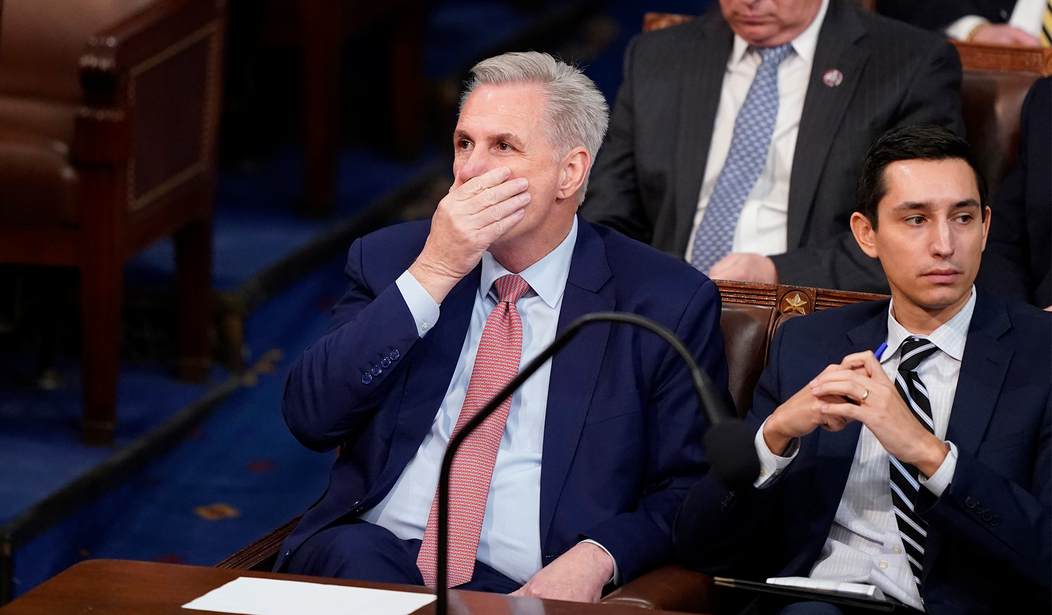Answer: Maybe, but not all by itself. That makes the sales pitch not just fraught but entirely hypothetical — and a political headache for the GOP and Kevin McCarthy.
Republicans campaigned last cycle, as they have in the past, on tax reforms that would either eliminate the IRS or render it nothing more than a bookkeeping function. As Semafor notes, the most popular two proposals for this promise are the flat tax and the so-called Fair Tax, both of which have floated around Washington DC for decades. Neither proposal has a prayer of getting into law this session, and one of them requires an even greater task than just getting a majority House vote:
The idea of a “fair tax” that would replace our current IRS code with a single sales tax was popularized on conservative talk radio in the late 1990s. It has kicked around Washington ever since, popping up in the occasional presidential platform, but never received a vote.
Its current champion in Congress is Georgia Rep. Earl “Buddy” Carter, whose Fair Tax Act would swap out the income, payroll, estate, and corporate levies for a 30% national sales tax. It would also send out “prebate” checks to soften the blow on lower income families, all while abolishing the Internal Revenue Service.
“Nobody likes to pay taxes, or at least, I don’t know anybody who does,” Carter said in a recent office interview. “But if they are going to pay a tax, I think they would much rather pay a consumption tax as opposed to an income tax.”
To make this work, though, Republicans would need to do more than just abolish the IRS. The Fair Tax proposals before now required a repeal of the 16th Amendment, in order to strip the federal government of authority to impose personal income taxes. Otherwise, even if by some miracle one could “abolish” the IRS in one cycle and replace income taxes with a consumption tax, a future Congress could create a new IRS and federal income tax to add to a federal sales tax.
Fair Tax proposals in the past recognized this, and Republican advocates shaped their consumption tax proposals so that they wouldn’t get a vote until after the repeal. That strategy explicitly protected the GOP from criticism of creating more taxation by ensuring the proper sequencing, and creating a hard stop if repeal didn’t succeed. The deal with McCarthy to get a vote for the plan appears to abandon that strategy just to ensure a vote takes place that has no chance of ever becoming law.
The political impact of that vote may well redound to Democrats’ favor, as Grover Norquist told Semafor:
“This is a political gift to Biden and the Democrats,” Grover Norquist, the dean of D.C. anti-tax activists, said in an interview. “I think that this is the first significant problem created for the Republican Party by the 20 people who thought that there was no downside to the approach they took.”
This may have two potential points of political liability for Republicans. If the proposal votes on the consumption tax before a vote to repeal the 16th Amendment, it looks like a vote for a tax increase. And if the tax rate is set at 30%, as has been reported, it’s a very high tax rate, higher than any I dimly recall from past Fair Tax proposals. That’s a huge bite at the cash register, and it hits immediately rather than passively every couple of weeks on paydays and once a year while filing tax returns. That may be a salutary change long term as people would be constantly reminded of how large a bite the federal government takes, but in the short run would be a very tough pill to swallow — even with a repeal of the 16th Amendment, which would take two-thirds of the House, Senate, and three quarters of the states to accomplish.
Democrats have already begun attacking this as a new tax, and scoffing at the egalitarian arguments made on its behalf. Semafor links to this from Joe Biden, for instance:
Outside the deepest trenches of conservatism, a 30 percent sales tax is mostly seen as an obvious political loser. Democrats, for their part, can hardly seem to believe their luck that their opponents might attach themselves to it.
“Great idea,” Biden deadpanned during a speech Monday. “It would raise taxes on the middle class by taxing thousands of everyday items from groceries to gas, while cutting taxes for the wealthiest Americans.”
It wouldn’t do any such thing. Part of the issue with the current tax structure is its reliance on income taxes. Most of the wealthiest Americans either get cash from capital gains, or even more so these days, from taking continuing loans from their assets that cost them nothing at all but keep them cash-liquid to their heart’s context. (The New Yorker had a very good primer on this process in their long analysis of a fight brewing between Getty trustees and their wealth manager(s).) By shifting from income to consumption, you force taxation on the use of that wealth and end the income dodges, which might also have another salutary effect in incentivizing more useful investment from that wealth. Furthermore, such a tax policy could easily exempt staple items such as groceries and clothing below a threshold amount; some states do that now with their own sales taxes.
Republicans would need to get out front of this and explain the policy. But when you’re explaining, you’re losing, and the mechanisms here are so complex that it’s going to be tough to explain them, let alone sell them. If a repeal of the 16th Amendment and an end to the IRS preceded this debate, it would make a sales pitch far easier than attempting to lead off with a 30% sales tax vote right off the bat.
What about the flat tax? That would make for better politics, but perhaps not a better solution. Leaving the 16th Amendment in place would still allow Congress to start inserting exemptions and penalties for their social-engineering ambitions, plus a future Congress would likely start adding brackets and more shelters — and probably sooner than later. Since any vote in this Congress is demonstrative rather than substantive, using a flat tax proposal for a vote this session makes better short-term political sense. It’s certainly better than asking House Republicans to endorse a 30% national sales tax up front.







Join the conversation as a VIP Member